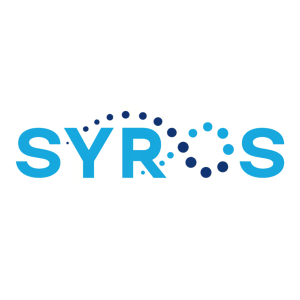Syros Announces First Patient in Dose Confirmation Study of SY-2101, a Novel Oral Form of Arsenic Trioxide, in Acute Promyelocytic Leukemia
Syros Pharmaceuticals (NASDAQ:SYRS) has initiated dosing in a confirmatory study for SY-2101, an oral formulation of arsenic trioxide aimed at treating acute promyelocytic leukemia (APL). This study will evaluate pharmacokinetics, safety, and tolerability, laying the groundwork for a planned Phase 3 trial. APL, accounting for about 10% of acute myeloid leukemia cases, has limited treatment options that can be burdensome. Preliminary Phase 1 data for SY-2101 is promising, and the company anticipates filing a New Drug Application by 2024.
- Initiation of dosing for SY-2101, indicating progression in clinical trials.
- Preliminary Phase 1 data shows promise for SY-2101, suggesting efficacy and tolerability.
- Plans to file a New Drug Application by 2024 could provide market advantage.
- None.
Confirmatory Dose and PK Data Expected in First Half of 2022, with a Phase 3 Trial Expected to Begin in 2022
“The current standard of care cures most patients but is tremendously burdensome, requiring regular and lengthy infusions of an IV formulation of ATO over nearly a yearlong course of treatment,” said
APL is a well-defined subtype of acute myeloid leukemia (AML), which accounts for about
"We are thrilled to now be dosing patients in our dose confirmation study of SY-2101,” said
The dose confirmation study is expected to enroll up to 24 patients with newly diagnosed APL and will evaluate safety, tolerability, and PK as well as the effect of food on the absorption of SY-2101. Patients will be enrolled during the consolidation phase of their APL treatment and will receive single doses of SY-2101 in a fasted state, SY-2101 in a fed state, and
Based on the results of the dose confirmation study, Syros expects to initiate a Phase 3 clinical trial in newly diagnosed APL patients. Based on input from the FDA, Syros believes molecular complete response rate and event-free survival in comparison to historical control data with
About
Syros is redefining the power of small molecules to control the expression of genes. Based on its unique ability to elucidate regulatory regions of the genome, Syros aims to develop medicines that provide a profound benefit for patients with diseases that have eluded other genomics-based approaches. Syros is advancing a robust clinical-stage pipeline, including: tamibarotene, a first-in-class oral selective RARα agonist in RARA-positive patients with higher-risk myelodysplastic syndrome and acute myeloid leukemia; SY-2101, a novel oral form of arsenic trioxide in patients with acute promyelocytic leukemia; and SY-5609, a highly selective and potent oral CDK7 inhibitor in patients with select solid tumors and blood cancers. Syros also has multiple preclinical and discovery programs in oncology and monogenic diseases. For more information, visit www.syros.com and follow us on Twitter (@SyrosPharma) and LinkedIn.
Cautionary Note Regarding Forward-Looking Statements
This press release contains forward-looking statements within the meaning of The Private Securities Litigation Reform Act of 1995, including without limitation statements regarding Syros’s clinical development plans with respect to SY-2101, the timing of anticipated data readouts from the dose confirmation study of SY-2101, the anticipated timing for initiating a Phase 3 trial of SY-2101, the potential submission of a new drug application and the likelihood of regulatory approval, the and the ability of SY-2101 to have a benefit for patients. The words ‘‘anticipate,’’ ‘‘believe,’’ ‘‘continue,’’ ‘‘could,’’ ‘‘estimate,’’ ‘‘expect,’’ “hope,” ‘‘intend,’’ ‘‘may,’’ ‘‘plan,’’ ‘‘potential,’’ ‘‘predict,’’ ‘‘project,’’ ‘‘target,’’ ‘‘should,’’ ‘‘would,’’ and similar expressions are intended to identify forward-looking statements, although not all forward-looking statements contain these identifying words. Actual results or events could differ materially from the plans, intentions and expectations disclosed in these forward-looking statements as a result of various important factors, including Syros’ ability to: advance the development of SY-2101 under the timelines it projects in current and future clinical trials; demonstrate in any current and future clinical trials the requisite safety, efficacy and combinability of SY-2101; sustain the responses seen to date with SY-2101; obtain and maintain patent protection for its drug candidates and the freedom to operate under third party intellectual property; obtain and maintain necessary regulatory approvals; identify, enter into and maintain collaboration agreements with third parties; manage competition; manage expenses; raise the substantial additional capital needed to achieve its business objectives; attract and retain qualified personnel; and successfully execute on its business strategies; risks described under the caption “Risk Factors” in Syros’ Annual Report on Form 10-K for the year ended
View source version on businesswire.com: https://www.businesswire.com/news/home/20210929005020/en/
Media Contact
917-698-9253
csolberg@syros.com
Investor Contact
Stern Investor Relations, Inc.
212-362-1200
hannah.deresiewicz@sternir.com
Source:
FAQ
What is the current status of SY-2101 clinical trials by Syros Pharmaceuticals?
When is the planned Phase 3 trial for SY-2101 expected to start?
How does SY-2101 compare to the current standard treatment for APL?
What are the anticipated outcomes from the SY-2101 dose confirmation study?







